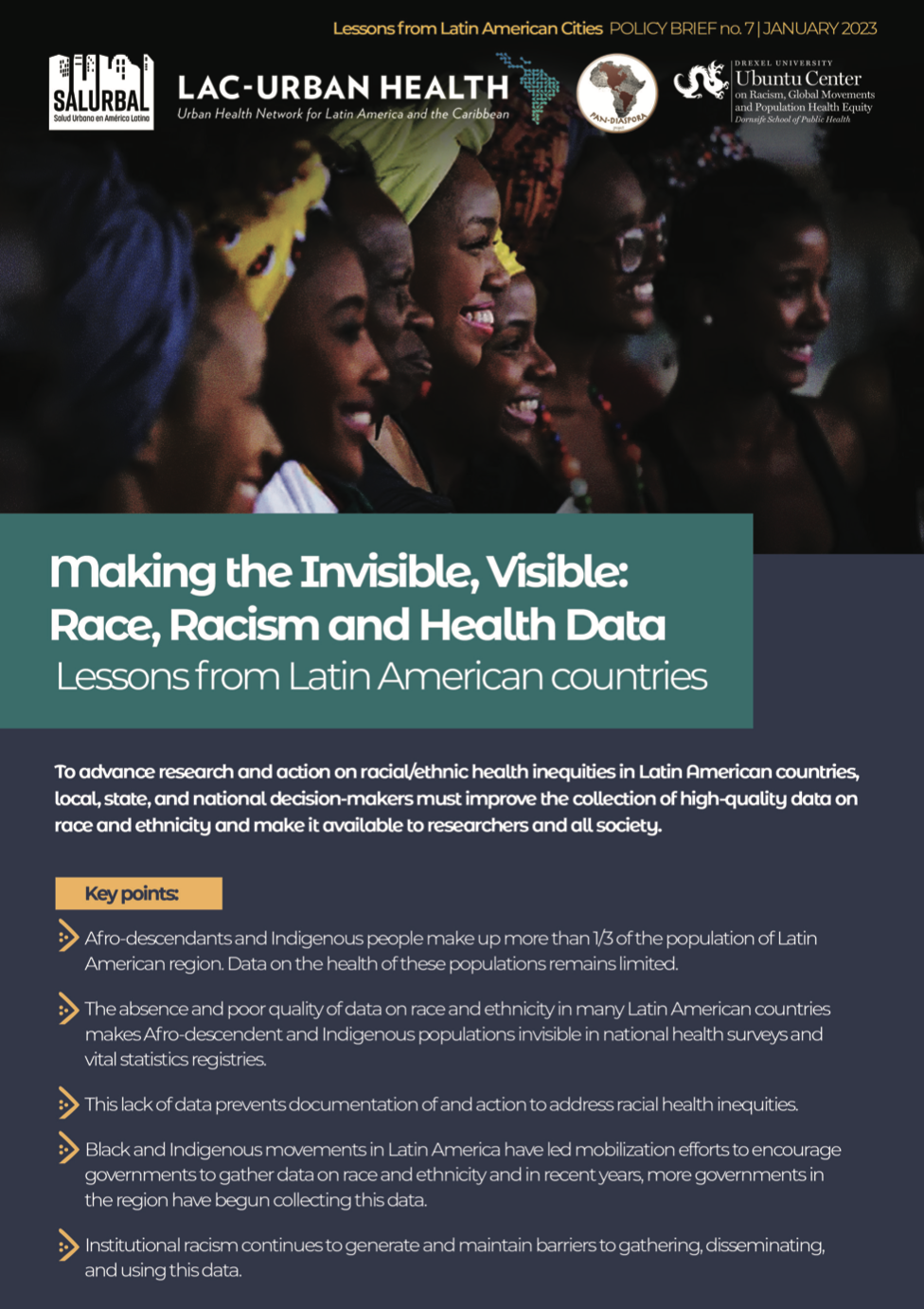“Making the invisible, visible”
The Ubuntu Center and SALURBAL partner to advance the conversation on race, racism and health data
Philadelphia, PA,
April 28, 2023
On January 31, 2023, the Drexel University Ubuntu Center convened a critical conversation on race, racism, and health data as part of the Diálogos SALURBAL events series. The full conversation, “Making the invisible visible: Race, racism, and health data: lessons from Latin American Countries” is available here.
The event brought together activists, academics, and decision-makers from across the Americas. Speakers included Dr. Diego Iván Lucumí Cuesta of the Universidad de los Andes in Colombia, Dr. Maria Inês da Silva Barbosa of the Universidade Federal de Mato Grosso in Brazil, Dr. Emanuelle Goes of Iyaleta and CIDACS - Centro de Integração de Dados e Conhecimentos para Saúde, and Dr. Mabel Carabali of McGill University in Canada. During a tri-lingual discussion offered with simultaneous translation in Spanish, English, and Portuguese, panelists reflected on the use, availability, and barriers to collecting race and ethnicity data in national census, health information systems, and vital statistics.
Dr. Sharrelle Barber moderated the discussion, noting, “Social movements and activism have helped to push us to a place where we at least acknowledge the need for improvements in data collection and systems. But this is not just a technical issue, it’s not even just a data issue – these are political issues with widespread implications for how we document racial inequities, the impacts of structural racisms and other forms of oppression, and how we develop the types of policies and actions necessary to address these impacts.”
“Within our own governments, there continues to be strong resistance to recognizing the term “race” as a category that even deserves to be addressed. And when these variables are collected, there are still important gaps in terms of how these issues are understood and how the information can be used to inform public policies,” commented Dr. Lucumí Cuesta [quote translated from original Spanish].

The event also served as the official announcement of the new, Canadian Institutes of Health Research Pan-Diaspora DIASPORA project (“Pan-American Data Initiative for the Analysis of Population Racial/Ethnic Health Inequities”) and the launch of the latest policy brief in the SALURBAL “Lessons from Latin America” series. The brief makes a powerful argument for improving the collection and availability of data on race and ethnicity to advance research and action on racial and ethnic health inequities across Latin America.
About the Ubuntu Center on Racism, Global Movements, and Population Health Equity
The Ubuntu Center is located at the Drexel University Dornsife School of Public Health and seeks to provide a platform and organizational infrastructure to advance collective anti-racism scholarship, training, and action. The Center’s mission is to unite diverse partners to generate and translate evidence, accelerate anti-racism solutions, and transform the health of communities locally, nationally, and globally.
To learn more about The Ubuntu Center, visit their website or download “The Ubuntu Approach.”
About the Pan-American Data Initiative for the Analysis of Population's Racial/Ethnic Health Inequalities (Pan-Diaspora)
Dr. Carabali and Dr. Barber are the Principal Investigators of the collective Pan-Diaspora research project, funded by the Canadian Institutes of Health Research (CIHR), will examine the availability, quality, and scope of data collected and used on race/ethnicity in urban areas in the Pan-American region. Grounded in structural racism and intersectional frameworks, this work has critical implications for the accurate documentation of racial health inequities, the creation of measures designed to describe the social conditions in which marginalized racial/ethnic groups are embedded (e.g., racial residential segregation), and the development of policy action designed to advance antiracism and mitigate and eliminate racial health inequities.
